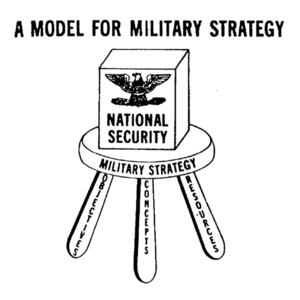Rethinking Strategy: A History of the Ends, Ways Means Model

“Rethinking Strategy: A History of the Ends, Ways Means Model“
Speaker: Webb, A. (US Army)
Date: 31 May 2019
Speaker Session Preview
SMA hosted speaker session presented by MAJ Andrew Webb (US Army) as a part of its SMA STRATCOM Academic Alliance Series. The circumstances of 1980s is why “Ends, Ways, Means” was developed and emerged as a dominate framework. Today, however, the Lykke’s “Ends, Ways, Means” model is inadequate for most strategy making. MAJ Webb informs us that COL Lykke developed his model over several years in the late 1970s through 1980s to initially teach students at the War College. Lykke was then called to provide testimony to the US Senate Arms Services Committee. In May 1989, “Defining Military Strategy” was published in Military Review and presented as the main, driving narrative for this edition. The Global Security Environment of the 1980s primed the acceptance of this model. Throughout the 1980s, the US Military realized that its impetus was to protect the Middle East and potentially prepare for conflict with the Soviet Union. The second major driver of this change was within the US Army at this time. The Army was existing under the shadow of Vietnam and the transformation of the Army, especially doctrine, including Active Defense and AirLand Battle. Doctrine becomes the center for how the Army thinks and fights. Lykke’s “Ends, Ways, Means” model of strategy emerged as the dominate strategy model within the U.S. Army in the 1980s despite three major weaknesses. First, Lykke separated military strategy from national strategy. The second is the problem of formulation. He made it additive (ends + means + resources) despite that even if one is missing, you still have strategy. Lykke also acknowledges the circular definitions of ends, ways, and means. Third, his questionable use of quotations from strategists (particularly use of speech from Maxwell Taylor). Rethinking the Ends, Ways, Means model is vital due to the overall importance of doctrine and the potential impact it has and overall, we are currently in a different world from the 1980s.
Comments